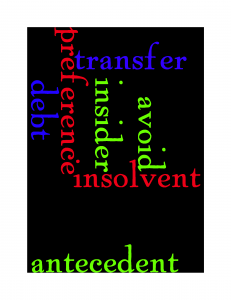When should the debtor care about preferences? When it was family or they are filing Chapter 13, is my short answer.
Everybody, debtors and lawyers, seem to know that there is something important about transfers made within 90 days of the commencement of the case. There seems to be lots of confusion about what that importance is.
Debtors think that making a preferential payment bars them from filing a bankruptcy case. Rookie lawyers think it covers only voluntary transfers and is irrelevant in Chapter 13. Wrong, wrong, wrong.
A transfer on account of an existing unsecured debt, made within 90 days of filing, while the debtor is insolvent, that allows the recipient to get more than he would have gotten had the transfer not been made and he’d been paid from the bankruptcy case on his claim, can be avoided for the benefit of the estate. Transfers to insiders, family and related entities, are avoidable if made within a year of filing.
Note that the transfer can be voluntary or involuntary. The definition of “transfer” includes not only payments of money and conveyances of title, but also the grant of a lien.
My guidelines for analysis of preferences:
- Who cares about voluntary payments to institutional creditors when filing Chapter 7?
- Transfers to family or other insiders matter a great deal to most clients-beware a filing that sets up family for suit.
- Find the transfers that, if avoided, create unencumbered, non exempt equity in assets
- Preferential transfers in Chapter 13 cases increase the liquidation dividend-can we live with that?
Let’s take these guidelines, one by one.
1. Voluntary payments on institutional debts. These are usually payments on credit cards, and unless the debtor expects to keep the credit card by paying off the debt, why should the debtor care if the trustee sues the transferee. The point that many people miss is that it is the recipient who is exposed to avoidance, not the debtor.
2. Transfers to insiders are painful if avoided. The instinct of many debtors is to take care of those close to them, making payments on inter family loans long after they’ve given up paying anyone else. If the transfers aggregate enough to make recovery economic for a trustee, the attorney needs to explore the issue with the client and perhaps the transferee.
3. Preferential liens if avoided create equity and chaos. Avoiding the judgment lien on an asset that the debtor could exempt is nifty; avoiding the last minute lien that sucked up non exempt equity in an asset can upset the debtor’s apple cart. Watch for liens granted long ago, but not perfected until close in time to the bankruptcy filing.
4. The best interests of creditors test in 13 assumes the Chapter 7 trustee avoids transfers. While a debtor in Chapter 13 can choose not to avoid preferential transfers, the measure of what the debtor must pay to unsecured creditors assumes that the hypothetical Chapter 7 trustee would avoid the transfer. The net recovery from that hypothetical action is part of the liquidation analysis for plan confirmation.
For these reasons, I see my initial interview with a client as an exploration of Chapter 5 of the bankruptcy code.









You sort of hint at this in your post, but another issue that can arise – even when the creditor is someone the client does not care about – is that the preferential claim might be tempting enough to induce the Chapter 7 Trustee to open an asset case on your client.
For instance, I usually tell my clients that there are certain threshold amounts in bank accounts, tax returns, and cash on hand below which the trustee will likely not be interested in opening an asset case on (since it just isn’t worth his or her time). But if you’ve got a big fat preference to ACME Collection Agency sitting on there – well, that could be a tempting enough target for the Trustee to open an asset case on you, and tack-on all those all those miscellaneous amounts on as a bonus.
Not to mention that having an asset case has other general negative implications that I’d rather avoid if I can help it. That can sometimes be reason enough to delay the filing a month or two to get that preference off the radar.
Seth D. Rogers
Longmont, CO
I seldom see a commercial consensual payment that would support a preference action given the kinds of threshholds that operate here.
But where I’ve had a property with a big capital gain associated with the foreclosure sale and I want the foreclosure to take place while the property is “property of the estate”, I have considered making a preferential payment just to keep the case open and the trustee dithering around, in the hopes the taxes get captured as an obligation of the estate.